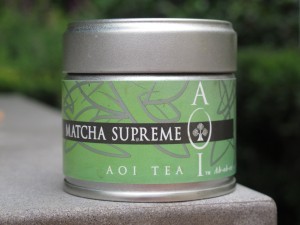Over the past few months, I have become a HUGE fan of Matcha (obsessed is probably a better word). I drink it every morning. In fact, it’s the first thing that I look forward to in the morning (after a smooch from the HOTY, of course). I wrote about it here a couple of months ago and thought that I would repost it because I’m forever telling people about it.
As you may recall, I’ve never been a coffee drinker. Not to even remotely suggest that I am a puritan. Hardly. I’m the girl who drank her weight in Diet Mountain Dew. I wish I were kidding.
Back to Matcha. WTF is it, you ask? It is finely milled powdered green tea, arguably the highest quality, most cultivated green tea variety. Matcha is the revered tea of the centuries-old Japanese tea ceremony.
What is especially unique about Matcha is that when you drink it, you’re drinking the green tea leaf itself, whole, in powdered form mixed with hot (but not boiling!) water.
The powder itself is so rich in chlorophyl (because it’s grown in the shade) that it’s literally bright green, and when mixed with water it becomes a rich, bitter-sweet, Kermit-colored concoction whose effects you can actually FEEL almost immediately after drinking a cup (Silver Lining).
There are innumerable health benefits of drinking Matcha. For example, one cup of Matcha is the equivalent of 10 glasses of green tea in terms of its nutritional value and antioxidant content.
Epigallocatechin Gallate (EGCG) is the compound found uniquely in green teas which has been shown to possess almost unbelievable anti-cancer, anti-aging and overall health benefits.
Here’s where Matcha is really unprecedented: Matcha contains exponentially higher amounts (as in over 100 times) of EGCG than regular brewed green tea. Matcha also has over 33 times the antioxidant levels of antioxidant powerhouse blueberries(!)…hard to believe, but true!
Additionally, Matcha supports healing, prevention and recovery from cancer (Silver Lining). It is also helpful for digestion and boosting metabolism.
An added benefit is that the L-Theanine in Matcha has been known to provide hours of lasting energy and clarity. L-theanine is the secret of the zen monk’s focus called “calm alertness.” Since I’ve started drinking Matcha, I wouldn’t say that I’m exactly a zen monk, but I can absolutely, positively feel more alert and less foggy (a HUGE SL!).
There are many non-Japanese (as well as Japanese) products out there called ‘Matcha’ that are often nothing more than powdered low-quality green tea, or worse, a mixture of ingredients with artificial green coloring(!).
My nutritionist extraordinaire, Rachel Beller, RD, MS turned me onto Matcha. She recommended that I drink Matcha Supreme from AOI Tea. Rachel also suggested squirting some lemon into the Matcha to exponentially increase the antioxidant effect (Silver Lining).
Tea beckons us to enjoy quality time with friends and loved ones, and especially to rediscover the art of relaxed conversation.
– Dorothea Johnson



If you like the tea, try some of their delicious recipes as well.
Sounds great! I'd love to!
Hollye, do you get one of the ceremonial teas? or the Ingredient Tea for the Home??
Hi Anne,
I get the Matcha Supreme. It comes in a powder form.
Enjoy!
Oh duh, there's a big picture of that right at the top of your post…. 😉
Glad you found it!
Hi Hollye,
I too drink matcha. Being Japanese, I've always known of its existence and have drunk it from time to time during tea ceremonies in Japan, but now I've switched to drinking it regularly instead of coffee. (I too am FBC patient, and coffee is not so recommended anymore..).
What I do every morning now instead of my cup of java, is to make a matcha latte, a drink available in every Starbucks in Asia: I make the matcha using the bamboo whisk, and then pour some delicious frothy steamed almond milk over it. If I feel like having it sweeter, I put a half-packet of stevia also.
Thanks for your comment, Ami! I do the exact same thing! It's soooooo yummy. Thank you again for your note!